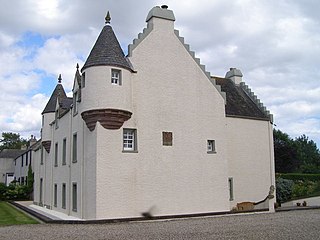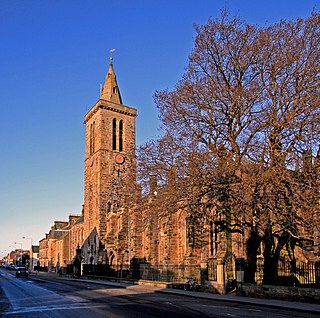Related Research Articles

The Scottish Enlightenment was the period in 18th- and early-19th-century Scotland characterised by an outpouring of intellectual and scientific accomplishments. By the eighteenth century, Scotland had a network of parish schools in the Lowlands and five universities. The Enlightenment culture was based on close readings of new books, and intense discussions took place daily at such intellectual gathering places in Edinburgh as The Select Society and, later, The Poker Club, as well as within Scotland's ancient universities.

Edward Arthur Milne FRS was a British astrophysicist and mathematician.

The Royal Society of Edinburgh is Scotland's national academy of science and letters. It is a registered charity, operating on a wholly independent and non-party-political basis and providing public benefit throughout Scotland. It was established in 1783. As of 2021, there are around 1,600 Fellows.
John Bennett Black (1883–1964) was a Scottish historian whose primary topic of study was of Elizabethan England. From 1930 to 1953 he was Burnett-Fletcher Professor of History at the University of Aberdeen where a prize is awarded each year in his name.

Monboddo House is a historically famous mansion in The Mearns, Scotland. The structure was generally associated with the Burnett of Leys family. The property itself was owned by the Barclay family from the 13th century, at which time a tower house structure was erected. In 1593, the Laird was James Strachan, and thence it passed into the Irvine family and thereafter the Burnetts of Leys. There is a notable datestone adornment on the structure with the arms of Irvine impaling the arms of Douglas with initials R.E. and I.E. and dated 1635, representing the 17th-century couple who reconstructed the house, Robert Ervine and Ilizabeth Ervine. Monboddo House, with its crow-stepped gable design, is situated in the Howe of Mearns near the village of Auchenblae approximately nine miles (14 km) from the North Sea. The original landholding of the Monboddo Estate was approximately 200 km².

The House of Burnett is a Lowland and Border Scottish family composed of several branches. The Chief of the Name and Arms of Burnett is James Comyn Amherst Burnett of Leys.

The Chair of Scottish History and Literature at the University of Glasgow was founded in 1913, endowed by a grant from the receipts of the 1911 Scottish Exhibition held in Glasgow's Kelvingrove Park, as well as donations from the Merchants House of Glasgow and other donors. The chair has been held by a number of prominent historians of Scotland, including two Historiographers Royal. Although the chair is now based within the Department of History, it retains its original title.
The Regius Professor of Medicine is an appointment held at the University of Aberdeen, in Scotland and was formally founded in 1858 by Queen Victoria.
George Osborne Sayles, better known as G. O. Sayles, was an English historian best known for his work on the medieval English law courts and the early English Parliaments.
The British musicologist and Arabist, Henry George Farmer studied under Thomas Hunter Weir, Professor of Oriental Languages at University of Glasgow. He wrote extensively about Arab musical influences on the European musical tradition and the Islamic legacy to music theory.
Robert I. Frost is a British historian and academic. His interests are in the history of Eastern and Northern Europe of 14th-19th centuries, with primary focus on Poland–Lithuania and the history of warfare of the period.

Charles Sanford Terry was an English historian and musicologist who published extensively on Scottish and European history as well as the life and works of J. S. Bach.
John Desmond Hargreaves was the Burnett-Fletcher Professor of History at the University of Aberdeen.

Andrew Finlay Walls was a British historian of missions, best known for his pioneering studies of the history of the African church and a pioneer in the academic field of World Christianity.
William Croft Dickinson, CBE was an English historian, a leading expert in the history of early modern Scotland and an author of both children's fiction and adult ghost stories.

Scottish education in the nineteenth century concerns all forms of education, including schools, universities and informal instruction, in Scotland in the nineteenth century. By the late seventeenth century there was a largely complete system of parish schools, but it was undermined by the Industrial Revolution and rapid urbanisation. The Church of Scotland, the Free Church of Scotland and the Catholic church embarked on programmes of school building to fill in the gaps in provision, creating a fragmented system. Attempts to supplement the parish system included Sunday schools, mission schools, ragged schools, Bible societies and improvement classes. Scots played a major part in the development of teacher education with figures including William Watson, Thomas Guthrie, Andrew Bell, John Wood and David Stow. Scottish schoolmasters gained a reputation for strictness and frequent use of the tawse. The perceived problems and fragmentation of the Scottish school system led to a process of secularisation, as the state took increasing control. The Education (Scotland) Act 1872 transferred the Kirk and Free Kirk schools to regional School Boards and made some provision for secondary education. In 1890 school fees were abolished, creating a state-funded, national system of compulsory free basic education with common examinations.

The history of universities in Scotland includes the development of all universities and university colleges in Scotland, between their foundation between the fifteenth century and the present day. Until the fifteenth century, those Scots who wished to attend university had to travel to England, or to the Continent. This situation was transformed by the founding of St John's College, St Andrews in 1418 by Henry Wardlaw, bishop of St. Andrews. St Salvator's College was added to St. Andrews in 1450. The other great bishoprics followed, with the University of Glasgow being founded in 1451 and King's College, Aberdeen in 1495. Initially, these institutions were designed for the training of clerics, but they would increasingly be used by laymen. International contacts helped integrate Scotland into a wider European scholarly world and would be one of the most important ways in which the new ideas of humanism were brought into Scottish intellectual life in the sixteenth century.
James Traill DD (1794–1873) was an Anglican bishop in the second half of the 18th century.

The Saint Andrew's Society of Montreal is a non-profit organization based in Montreal dedicated to celebrating Scottish heritage. It was founded in 1835.
The 1910–11 Scottish Districts season is a record of all the rugby union matches for Scotland's district teams.
References
- ↑ Sayles, G. O. (1982). Scripta Diversa. History Series. 15. London: Hambledon Press. p. 133. ISBN 0907628125.
- ↑ Milne, Doreen J. (1998). A Century of History: The Establishment and First Century of the Department of History in the University of Aberdeen. Aberdeen: Centre for Scottish Studies for the Department of History. p. 76. ISBN 9780906265246.
- ↑ "Sharp end of history". The Herald. Glasgow. Retrieved 8 September 2021.
- ↑ "Professor Allan Iain MacInnes FRSE".